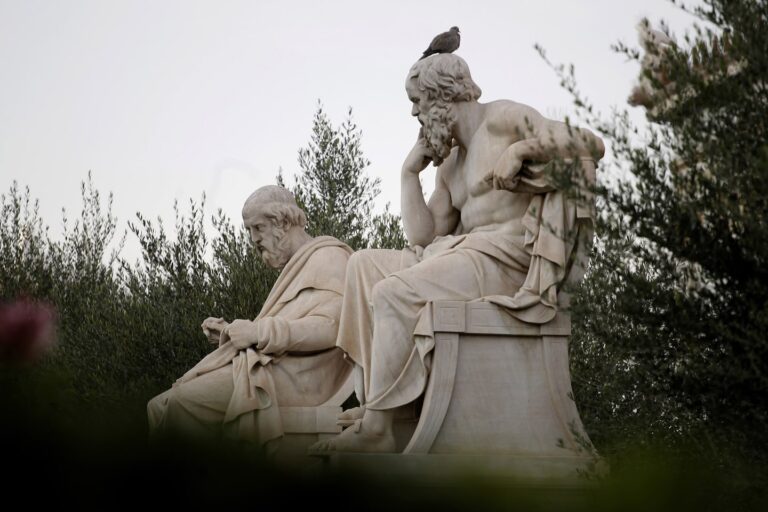Hadot’s view of philosophy as a way of life was unusual, but his erudition regarding the ancient Greek schools was undeniable. In France, Michel Foucault was very attracted to the idea of spiritual exercises, which he integrated into his own writings as technologies of the self. How did we manage to become the kind of individuals we are? How do formal and informal practices – from schools to prisons to therapies and medications – create and limit our options? For Foucault, the essential question was: “Can we live differently?” Can we find ways of being different from those that contemporary regimes of individuality have defined for us as natural, healthy and acceptable?
Hadot’s and Foucault’s questions were radical at first, but they have now been integrated into the American version of personal development. Self-help and its new narcissistic variant, self-care, are not what French thinkers were aiming for, but now university philosophy departments will tell you how to live a good life, and psychology departments will tell you how to be happy. These courses increase enrollment among undergraduates wanting more achievement and less anxiety related to their education.
In “The quest for character: what the story of Socrates and Alcibiades teaches us about our search for good leaders“, Massimo Pigliucci embraces this version of the self-help philosophy, drawing from the field’s history for valuable advice to help us build better characters. The author approaches this topic from evolutionary biology, where he is an expert in phenotypic plasticity, the ability of an organism to adapt to better integrate into its environment. It is not a stretch to view his character work through this evolutionary lens. We can develop to better integrate in the societies to which we belong and perhaps make these societies more hospitable for survival.
But unlike his work in biology, Pigliucci’s work in philosophy focuses on ethics and politics – not only on how we can survive, but also on how we can live well together. This “well” should be the subject of debate and critical examination. It was the same for Socrates, the hero of this book, to whom the Oracle told that he was the wisest among the Athenians. He realized it was because he knew he didn’t know much. Other Athenians were sure of their answers to important questions, but when Socrates pressed them, they often left their conversations quite perplexed.
Pigliucci’s Socrates is a gentle teacher who guides students away from errors and toward more reliable opinions. Like a sculptor chipping away at a slab of marble, he carves away the untruths to reveal something worth seeing. Given Socrates’ talents as an interlocutor, Pigliucci wonders why he failed to educate the handsome, rich, and powerful Alcibiades to become a better statesman. Alcibiades, a controversial political and military leader, had every advantage, and Socrates was his friend and mentor (and perhaps his lover). But the young man continued to show greed at every turn, to be treacherous in his relationships with his friends, and to become an example of bad behavior. The failure of Alcibiades’ education led Pigliucci to a series of sketches about the challenge and importance of trying to improve the character of political leaders. He considers Plato’s efforts with the tyrants of Syracuse, Aristotle’s influence on Alexander the Great, and Seneca’s failures with the evil Nero before moving on to more general thoughts on character and power.
There are no big surprises here – just a reminder that character matters in political leaders. Given the current state of the country, I wonder if we need such a reminder.
The constant task of the philosopher has been to create opportunities to recognize what really matters – to teach oneself and others to turn one’s attention away from what should have little weight and to devote oneself (perhaps through spiritual exercises) to the most important things or questions. Alcibiades loved wealth and power, which Pigliucci, like Socrates, does not consider to be the most important things. So why did Socrates remain so attached to Alcibiades? Socrates reportedly said that Athenian fame was “attached to stupidity,” but he could not take his eyes off the beautiful, rich, and powerful young man. Perhaps efforts to develop good character are not always in line with individual desires? If so, are spiritual exercises supposed to change ailments? Who decides what things are appropriate to desire? What happens when a person’s desires conflict with each other or with the interests of those in authority? There are no easy ways to answer these questions and so they are not addressed in “The Quest for Character.”
Pigliucci doesn’t want his readers to be confused. He wants us to realize that being aware of our own flaws and practicing to reduce them will make us “better human beings.” By “better” he simply means more considerate of others, kinder, more generous, and less likely to do bad things because of the bad people around us. The Stoic Advice: Accept the things we must, improve the things we can.
These self-help bromides are certainly incontrovertible, but they have little to do with Socrates, who was put to death by his fellow citizens because of his radical questioning. Pigliucci suggests that contemporary science and ancient Stoicism can be combined to help us be kinder and gentler, avoiding bad people and finding role models who inspire us to act more consistently in accordance with our good character.
We are lucky. We no longer have to worry about charismatic leaders like Alcibiades (or Nero!), nor the systems that give rise to them. If you believe that, this book is for you.
Michael S. Roth is the president of Wesleyan University. His latest book is “Safe Enough Spaces: A Pragmatic Approach to Inclusion, Free Speech, and Political Correctness on College Campuses.”
What the story of Socrates and Alcibiades teaches us about our search for good leaders
